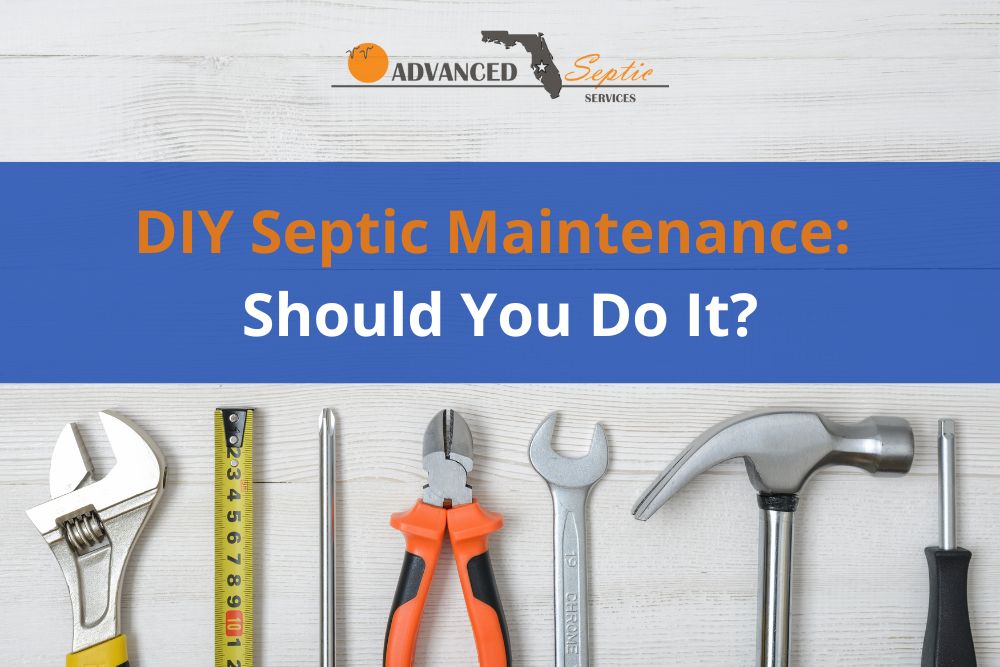Maintaining your septic system is essential for its longevity and performance. Regular upkeep and septic maintenance can save you from expensive repairs or replacements down the road.
This always leads to the question of what septic system maintenance you can do DIY.
While some septic maintenance tasks are manageable for homeowners, others require the expertise of professionals. This guide will help you identify which tasks you can tackle and when to call in the pros.

Understanding Your Septic System
Before diving into maintenance, it’s helpful to understand how your septic system works. At its core, a septic system consists of a septic tank and a drain field. Wastewater from your home flows into the tank, where solids settle at the bottom, and scum floats to the top. The liquid effluent exits the tank and enters the drain field for further treatment.
Now comes the role of maintenance. Before we dive into what septic maintenance you can handle, we must proceed cautiously. If you are ever unsure — please call the professionals.
DIY Septic Maintenance Tasks
Regular Visual Inspections
Homeowners can perform basic visual checks of the septic system. Look for signs of trouble, such as standing water near the drain field, unpleasant odors, or slow drainage in your sinks and toilets.
Tips for Visual Septic Inspections:
- Walk around your drain field periodically to check for soggy patches.
- Inspect the area for foul smells, which may indicate a problem.
- Look inside your septic tank (if you’re comfortable) using a flashlight to ensure it isn’t overfilled.
Water Conservation
One of the simplest ways to maintain your septic system is by conserving water. Excessive water usage can overwhelm the tank and drain field.
How to Conserve Water:
- Fix leaky faucets and toilets promptly.
- Install water-efficient fixtures.
- Spread out laundry and dishwasher loads throughout the week.
Proper Waste Disposal
What you flush or pour down the drain significantly affects your septic system. Homeowners can ensure that only septic-safe materials enter the system.
Do’s:
- Use biodegradable toilet paper.
- Dispose of cooking grease and oils in the trash.
- Limit chemical cleaners and harsh detergents.
Don’ts:
- Avoid flushing non-biodegradable items like wipes, feminine hygiene products, or dental floss.
- Never pour paint, solvents, or hazardous chemicals down the drain.
Maintain the Drain Field
Keeping your drain field in good condition is crucial for overall system health.
Tips for a Healthy Leachfield
- Keep heavy vehicles and equipment off the drain field to prevent soil compaction.
- Plant only grass or shallow-rooted plants over the drain field to avoid root damage.
- Redirect rainwater runoff away from the drain field to prevent oversaturation.
Add Bacteria Boosters (When Necessary)
Septic systems rely on bacteria to break down waste. Homeowners can occasionally add bacteria boosters to maintain a healthy balance in the tank.
This one is a 50-50 on DIY and working with a professional. Before you add boosters to your tank, consult a professional to assess if this is the right action for your septic tank.
When to Call a Professional
While homeowners can handle some aspects of septic maintenance, others require professional expertise to prevent costly damage.
Pumping the Septic Tank
Depending on usage and tank size, septic tanks need to be pumped every 3-5 years. Professionals have the equipment and expertise to remove accumulated solids safely.
Why Leave It to the Pros?
- They can properly dispose of waste in compliance with local regulations.
- Professionals can identify potential issues during pumping.
- You probably don’t have the proper equipment (please do not use a dry/wet vacuum to pump your tank…)
Diagnosing and Repairing Problems
If you notice persistent odors, slow drains, or sewage backups, it’s time to call a professional. These symptoms often indicate serious issues such as a clogged pipe, damaged tank, or failing drain field.
Signs to Watch For:
- Gurgling sounds in your plumbing.
- Sewage odors in your yard or home.
- Overflowing or persistently wet drain fields.
Conducting Comprehensive Inspections
Routine inspections by professionals can uncover hidden issues before they escalate.
What Professionals Check:
- The structural integrity of the septic tank.
- Effluent levels and sludge depth.
- The functionality of distribution boxes and drain field components.
Major Repairs or Replacements
Tasks like replacing a septic tank lid, fixing cracked pipes, or repairing the drain field should always be left to licensed experts. Attempting these repairs without proper knowledge and tools can worsen the problem.
Installing or Upgrading the System
Whether building a new home or upgrading an old system, professional installation is essential to ensure compliance with local codes and optimal performance.
Benefits of Professional Septic Services
Relying on professionals for complex tasks ensures:
- Safety: Septic work involves exposure to hazardous waste.
- Accuracy: Pros can diagnose issues more effectively with specialized tools.
- Compliance: Professionals adhere to local regulations and environmental standards.
Getting Your Septic Maintenance Right
Septic system maintenance doesn’t have to be overwhelming. By handling basic tasks yourself and knowing when to call in professionals, you can extend the lifespan of your system and avoid costly repairs.
Whether checking for issues or scheduling professional pumping, a proactive approach is the key to a healthy, efficient septic system.
For expert advice and reliable septic services in Central Florida, contact Advanced Septic Services at 352-242-6100. Your system deserves the best care!

